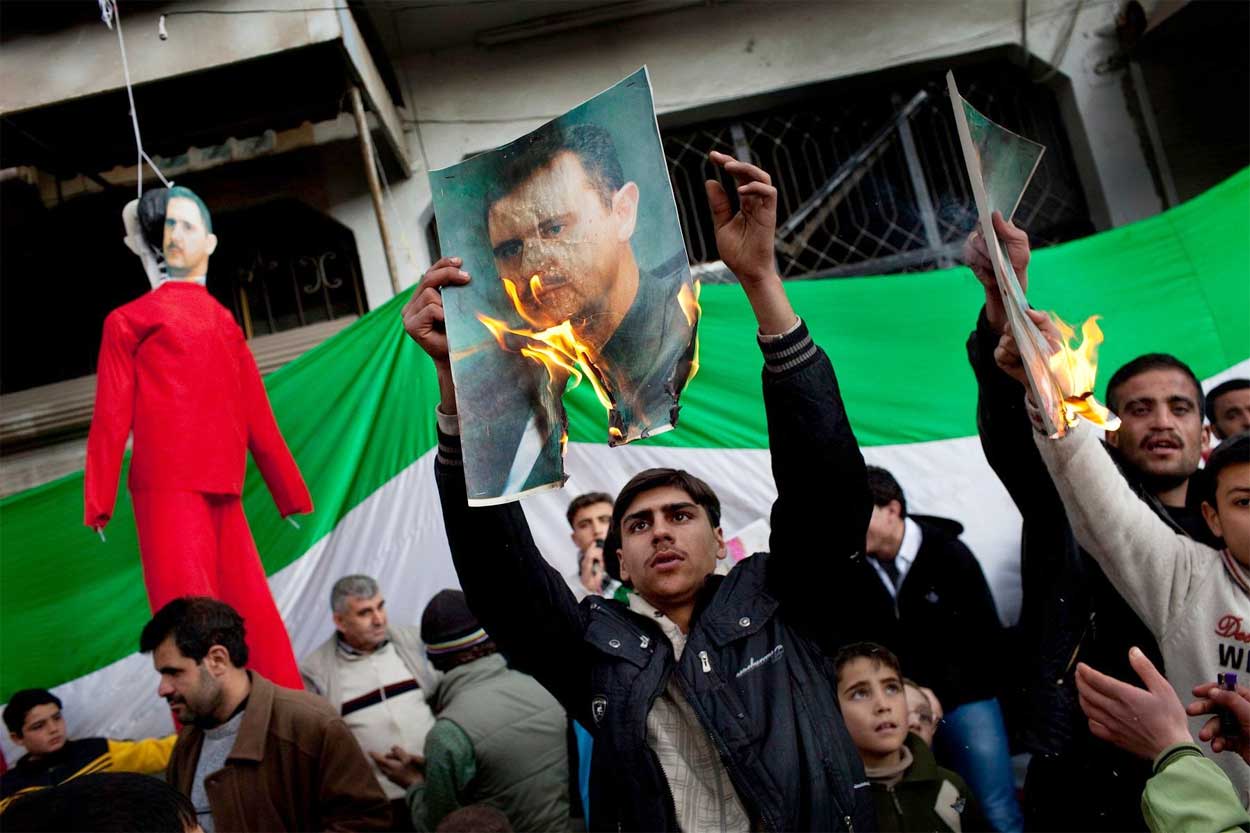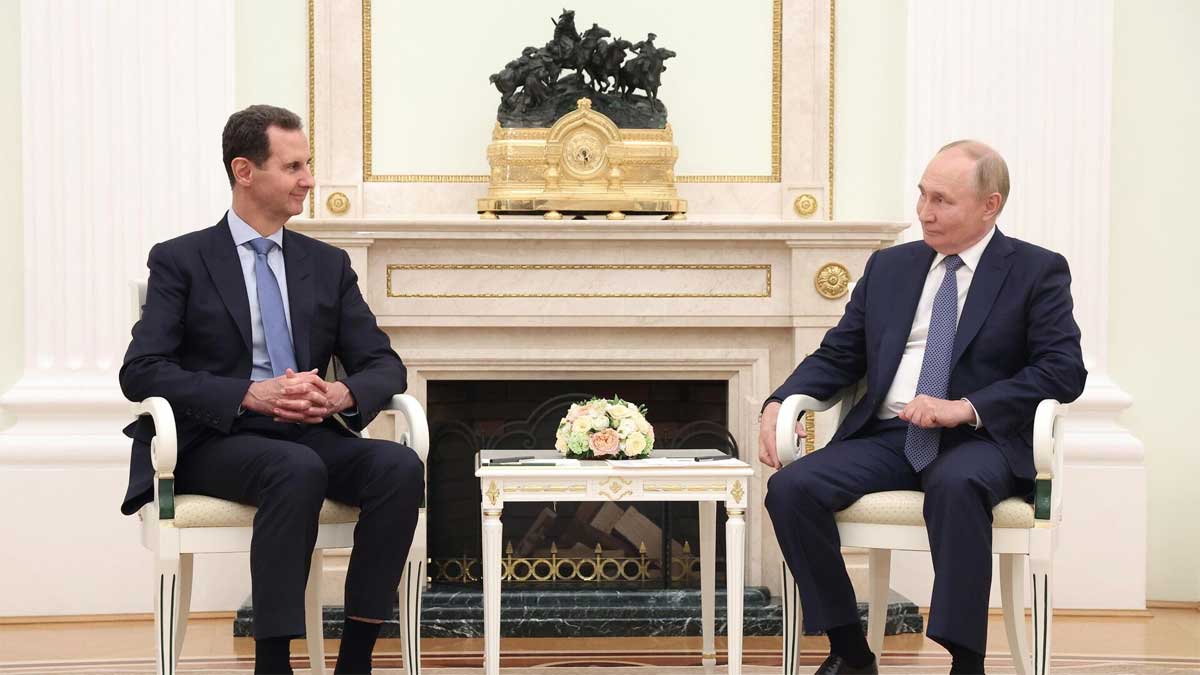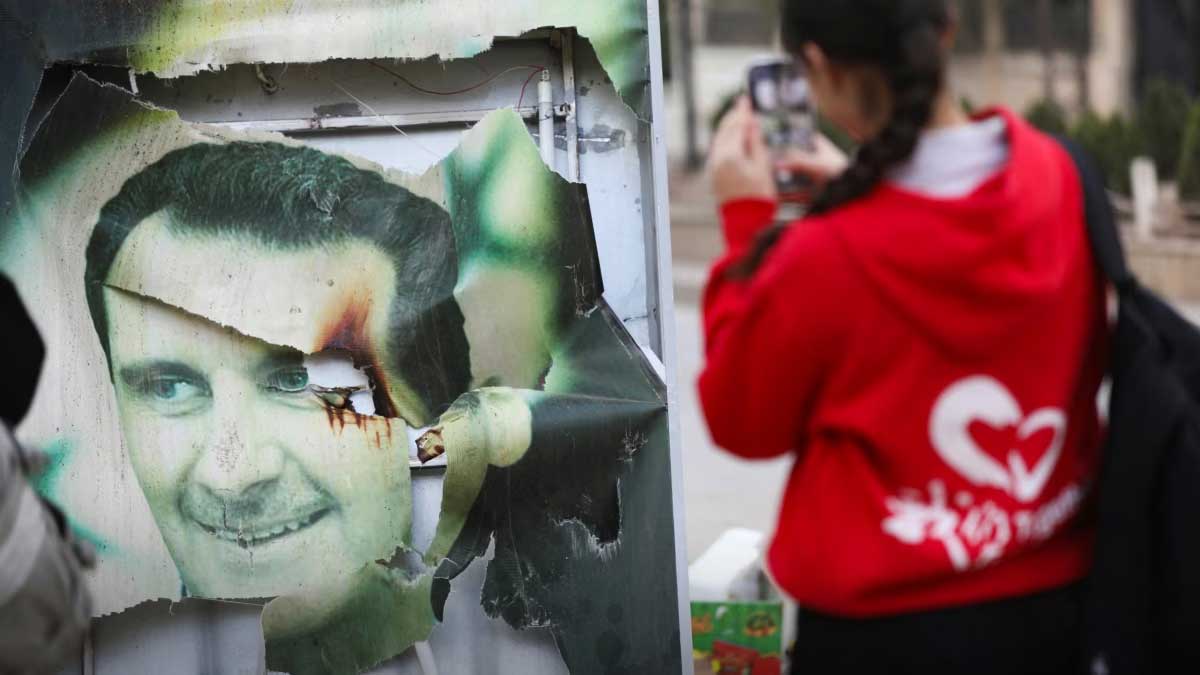
Photo: AP Photo / Rodrigo Abd
In just a few days, the Assad's dictatorial regime, a clan that ruled Syria for half a century in the most brutal way, with wild repression, was overthrown. Local sources reported that from the Saydnaya prison, a terrible prison near Damascus, former Syrian Air Force pilot Rashid Al-Tatari was released after 43 years of imprisonment. In 1980, during the rule of Hafez Assad, he refused to bomb the city of Hama during the suppression of protests that erupted there. For this, he spent 43 years in Saydnaya. Women were also held in this military prison, including those with children who were born in prison as a result of violence against female prisoners and who had never seen the sun, the sky, and knew nothing about birds and animals.
Putin in Syria
For us, of course, the most interesting and important thing in this story is that Putin's claims to the role of one of the leaders of the global world and Russia as a global power collapsed in 11 days. And they collapsed due to the efforts of so-called non-state actors. That is, not some states intervened, but a rebel army called "Hayat Tahrir al-Sham"**, translated as "Organization for the Liberation of the Levant," led by the 42-year-old leader Al-Julani.
The second most important thing in this story is that the Assad army, which was trained and armed primarily by Russian military, abandoned their weapons and surrendered their dictator. And this always happens.
The latest Russian weapons were tested in Syria before the Ukrainian war. The Syrian army was not only armed by Russian advisers but also trained
One of the very interesting things is the speed with which Bashar Assad's regime collapsed. Initially, it was the long-standing regime of his father, Hafez Assad, who, in particular, plunged neighboring Lebanon into the devastation we see there now. Bashar Assad succeeded him, and his younger brother Maher led the terrible 4th Division, which was involved in torture and executions. Thirteen years ago, a civil war began in Syria, triggered by the "Arab Spring." And Assad was practically losing that war—not to the most remarkable guys, but he would have lost if Putin had not come to his aid, building two military bases in Syria and thus gaining access to the Mediterranean Sea. He simply saved Assad's regime with his planes in the sky, his advisers on the ground, and weapons, including the latest Russian weapons, which were tested in Syria before the Ukrainian war. The Syrian army was not only armed by Russian advisers but also trained.
The second leg on which Assad's power relied was the regime of the ayatollahs in Iran. The road from Tehran to Lebanon, where Iran's proxy army "Hezbollah" is based, passes through Syria, and the supply of "Hezbollah" with missiles and all other weapons against Israel went exactly through Syria. That is, Bashar Assad's regime was a very important element of expansion for Shiite Iran.
The long rule of the Assad clan was maintained through wild repression, the details of which are becoming known thanks to Arab and English-language media after the liberation of prisons and the capture of prison archives by rebels.

President of Syria Bashar Assad and President of Russia Vladimir Putin during a meeting, 2024.
Photo: RIA Novosti
Assad's aides, however, have recently weakened significantly. It became clear that Putin is unable to wage war on two fronts. As early as the summer of 2022, he began withdrawing units and even some weapons from bases in Syria. That is, Putin had neither the troops nor the weapons to save Assad. And Iran's proxy "Hezbollah," which acted on Assad's side and supported the Syrian regime, was heavily battered by Israel. Israel destroyed all the top leadership of "Hezbollah," a large number of its commanders, 4,000 fighters, and many weapons depots. In short, "Hezbollah" could not come to Assad's aid either. And as a result, everything else that was in Assad's hands collapsed like a house of cards.
Why Regimes Fall
In fact, for authoritarian regimes, there is nothing exceptional in this; this is exactly how such regimes fall. There are many examples, here is the closest to us. This is the so-called Red Sunset, when in 1989–1991 the communist empire collapsed. First the satellite countries, then the nearby colonies, and then the empire itself—the Soviet Union. And then, too, none of the scholars predicted this. Only in 1983 did Marshall Goldman's book "USSR in Crisis" come out, and then the author was simply pecked at, saying these were some illusions of his, he was too right-wing and therefore treated the Soviet Union that way. But he was absolutely right: the Soviet Union was already in a severe economic crisis, but Goldman was not believed. And there was an article by Stephen Cohen, a very famous American historian, who, returning from the perestroika Soviet Union, wrote an article that the USSR was ending. This article went unnoticed. All other leading experts in political science, the Soviet Union, and totalitarian regimes did not expect what would happen in the next three years when the collapse of the communist empire began. In fact, there is another textbook example: a week before the fall of communist power in the German Democratic Republic, the popularity rating of its leader Honecker was 70%. This is to say about all popularity ratings, including Putin's. Similarly, in Romania, after a few days of protests, the regime of the "great leader" Ceausescu fell.
One of the most important measures of the temperature inside society and understanding what is happening are free competitive elections. Another is a free press. In dictatorial regimes, these channels are closed
Why does this happen in such regimes? Because these are regimes where all information channels are blocked. One of the most important measures of the temperature inside society and understanding what is happening inside are free competitive elections, where different politicians offer people different baskets of political goods, and what people choose shows what they reject, what they do not want or cannot tolerate anymore. Such elections have not existed in Russia since at least 2004, if not since 2000.
The second channel of information about what is happening is a free press, which writes about discontent, protests, and real processes that are happening directly on the ground. In Putin's Russia, as in Assad's Syria, the free press was destroyed at the root. So this source of information does not exist.
The third source of information is sociological surveys. Very unreliable, as has become clear recently, but in authoritarian regimes like Putin's or Assad's, there is no sociology at all, it is completely meaningless because there sociology measures people's fears, not what they really think about the people who rule them in Moscow, or in Damascus, or in Tehran.
Scene, Bridgehead, Testing Ground
Why did Putin get involved in Syria? Let me remind you that Barack Obama, during his presidency of the United States, called Russia a "regional power." For Putin, this was like a red rag to a bull. The world (or at least Europe) had the opportunity to see back in 2007, after he delivered his famous Munich speech, that he was completely obsessed with the idea that he was the leader of a global power. It was then that he decided to support Assad's regime and built two military bases in Syria. And then, immediately, the American media, many analysts began to write that Putin had become one of the most important players in the Middle East. And since the Middle East is such an explosive point in the world, as the Balkans were in the 20th century, everyone took this event quite seriously. And this is exactly what Putin, a dictator tormented by various complexes, needed—to be recognized as a player on the world stage. Well, then Putin used Syria as a bridgehead for testing Russian weapons and honing the actions of the Russian army. Practically all the generals who have been fighting in Ukraine for these two and a half years have gone through the Syrian war, through the Syrian front. So for him, it was also a great testing ground.
During Assad's regime, according to various estimates, 300–400 thousand people died, millions are in exile, plus the Assads completely destroyed Lebanon. Putin is not at all concerned about this, just as he is not concerned today about the colossal losses of the Russian army in Ukraine and the gigantic expenses on the war, depleting the Russian economy. But recognition of him as a player on the world political stage was absolutely crucial for Putin. Now Putin is in a very difficult position. Despite all the bluff that both Putin and his entourage demonstrate about how Russia is endlessly winning, in fact, the Russian dictator desperately needs a truce in Ukraine: today's situation in Syria has shown that Putin has no spare resources, he has to leave Syria.
The Tragedy of Powerlessness
Who came to power in Syria? Who literally in a dozen days captured all the major cities of Syria—Aleppo, Hama, Homs, and finally Damascus? At the head of the rebels are jihadists of various kinds, but primarily "Hayat Tahrir al-Sham." Its leader, 42-year-old Al-Julani, was born in Saudi Arabia in a family of exiled Syrians. When the US war in Iraq began, he joined "Al-Qaeda"** and went to fight against the Americans. The Americans promised $10 million for Julani's head. Now in an interview he gave a few days ago to CNN, Julani says that he broke with "Al-Qaeda," that they do not persecute anyone on religious grounds, they supposedly took Christians, who were severely persecuted in Syria, under protection. They supposedly set up a fence at Assad's palace, although this did not help, everything that could be taken out was taken out, and the Iranian embassy in Damascus was looted.
Unfortunately, we remember this from Iraq, when even Iraq's cultural shrines were looted, when Hussein was overthrown and there was no power in Baghdad. Now in Syria, at least de jure, the prime minister remains in power, who made a statement on Syrian television channels (Syrian television is also in the hands of the rebels) that he is ready to peacefully transfer power, that he will perform his duties so that at least some semblance of a state exists. But from what is written and shown on various international channels, it is clear that there is no state there, no police, no checks at the international airport in Damascus, and everything exists in some incomprehensible way. Unfortunately, this always happens in such revolutions. Revolutions are always blood, always death, and always the power of the crowd. The terrible power of the crowd, which does not distinguish between good and bad, right and guilty. I am afraid that Syria will not avoid this either. It is difficult, completely impossible to assume that democracy will come to replace Assad's tyranny.

A torn and burned portrait of Bashar Assad in Al-Qamishli in northeastern Syria, December 8, 2024. Photo: REUTERS / Orhan Qereman
Different players in the global world have their interests in Syria. Israel has deployed troops in the buffer zone near the Golan Heights, where three borders converge. And many countries in the world still consider the Golan to be part of Syria. Although the people who live there will never leave. Of course, Iran has interests, which has suffered a defeat but will try to provoke conflicts between Sunnis and Shiites. The United States bombed the remnants of ISIS**, which "Hayat Tahrir al-Sham" is now hostile to. I believe the United States is keeping an eye on even the intention of the revival of the Islamic State**. Al-Julani says that he does not claim any caliphate, that he is only fighting for the liberation of Syria from the Assad clan regime. But even if the United States and other democratic countries try to artificially create a regime of democracy in Syria, it may well end up like the attempt to build democracy in Afghanistan, from which the United States was forced to flee under the pressure of the Taliban, which returned Afghanistan to the Middle Ages.
This is also related to the fact that the transition from tyranny to democracy, as transition theories show, depends on what countries surround country X. Syria is surrounded by countries not with democratic, but with extremely authoritarian and religious regimes. And the examples of neighbors are very important. They are important for dictators, they are important for civil society, they are important for activists and politicians who look and learn how to overthrow tyrants and how to fight harsh regimes. Unfortunately, Syria has no such examples. And now, perhaps, a very important task for the new government of Syria is to avoid another inter-sectarian and inter-confessional conflict. So that again Shiites along with Alawites do not start cutting Sunnis and Christians, fighting with Kurds and Druze.
If it is possible to create a government in which leaders of different branches of Islam would be represented and they would stop cutting each other, this would already be a significant step forward
In short, we hope that at least the civil war in Syria will end. That some government will be formed there and elections will be held in six months, as Julani promises. It is not very clear how it is possible in a completely destroyed country, with millions of compatriots scattered across different countries of the world, to hold elections in such a time frame. Especially since the organization led by Al-Julani is described as completely authoritarian, jihadist, harsh, and not adhering to democratic principles. But if it is possible to create an inclusive government, so that leaders of different branches of Islam are represented there and they stop cutting each other, this would already be a significant step forward.
There is a lot of enthusiasm in the press now about the overthrow of Assad's regime and hopes that just a little more, and Syria will become a land of freedom and prosperity. These are quite naive, of course, reflections. All studies show that after the collapse of harsh regimes, bad usually follows first. The other question is that such regimes, which follow totalitarian or authoritarian, dictatorial ones, are short-lived, they have no legitimacy. And legitimacy is created, among other things, by a long stay in power. People kind of accept the status quo and believe that nothing else can be. The Alawites of the Assad clan were in power in Syria for half a century, people got used to them. Those who come to replace them are not necessarily good guys, they are at least very different and unpredictable. In any case, as Joseph Biden said in his statement, we will judge by deeds. God willing, the civil war will end there, that would already be a great achievement.
Of course, it is important for us how the inglorious departure of Russia from Syria, the collapse of Assad's dictatorship, will affect the Putin regime. We see from the protests, which have been going on in Iran for many years, that dictatorial and autocratic regimes can collapse at any moment when their time comes, when either some external trigger or some interests, groups, clans within each individual country decide that they have had enough—they are tired of feeding Assad, Khomeini, Putin, Lukashenko, and so on, and want to feed themselves at the oil, gas, or drug spigot.
So the current Syrian story is also about how everything will end at home, in Russia, in due time.
Video version:
* Evgenia Albats is declared a "foreign agent" in the Russian Federation.
** "Hayat Tahrir al-Sham," "Al-Qaeda," ISIS (Islamic State) are international terrorist organizations banned in the Russian Federation.